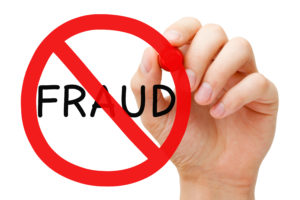Identity Theft Information

Identity theft occurs when someone uses your personal information without your knowledge to commit fraud or other crimes. In many cases, the victim is unaware of the activity until months after the incident. The effect of identity theft can be costly to you in terms of time and money.
Identity Theft can happen in various ways:
- After someone steals your wallet, purse or mail.
- By stealing personnel records from employers.
- By pretending to be financial institutions or businesses and sending spam email (called phishing) or pop-up messages in an attempt to get you to reveal your personal information.
- Identity thieves will also rummage through the trash at your home or workplace looking for bills or other documents with your personal information on it.
 Quick Links:
Quick Links:- FTC Identity Theft
- Privacy Policy
- Annual FREE Credit Report
- ID Theft Affidavit
- Unauthorized Transaction Form
To protect your identity, you should:
Review your credit reports. You can do this for free annually! Visit AnnualCreditReport.com or call 1-877-322-8228, which were established to handle consumer requests by the consumer reporting companies Equifax, Experian and Transunion. Place a fraud alert on your credit bureau files if you feel information has been exposed. Adopt daily practices like shredding your personal & financial documents, staying aware of the latest scams, protecting your home computer with anti-spyware, virus detection software and firewalls. Keep these programs up to date. Secure your mail by utilizing a Postal Service Mail Box or by placing your outgoing mail into a locked mailbox. Sign up for estatement services – not only does it protect your monthly statement, it also cuts down on paper and postage expense! Safeguard your Social Security Number – don’t leave your Social Security Card in your wallet and ask why when a person requests your SSN for business purposes. S.S.A. Fraud Hotline 1-800-269-0271-Don’t leave a paper trail. Never leave ATM, credit card or gas station receipts behind. Know with whom you are speaking with before providing any confidential information. If you are not sure about the legitimacy of the caller, hang up and call back by utilizing a telephone number familiar to you. Never click on links sent to you by an unsolicited email. Be alert for warning signs of possible Identity Theft, such as:
- Regular bills that do not arrive as expected.
- Denials of credit for no apparent reason.
- Account Statements or credit cards in the mail that you were not expecting.
- Calls or letters concerning purchases you did not make.
If you think your identity has been compromised:
- If your bank account(s) have been compromised, immediately notify your Financial Institution(s). Make a note for your file of what Institution was contacted, who you talked to and the date/time your call was made.
- Place a verbal password on your accounts to prevent thieves from calling in and finding out more about your financial transactions.-Close or transfer those accounts that have been compromised or tampered with to a new account number.
- Request that any account that was fraudulently opened in your name be closed immediately.
- Place a Fraud Alert and/or Credit Freeze on your Credit Report. You can do this by contacting the Credit Bureaus:
Experian: 1-888-397-3742
Equifax: 1-866-349-5191
TransUnion: 1-800-888-4213 - Request a copy of your Credit Reports and review them carefully. Question any unknown activity and report disputes in writing.
- File a police report and maintain a copy in your file for future reference.
- File a report with the Federal Trade Commission. You can do this online via ftc.gov
ID Theft Hotline 1-877-438-4338 - Keep an eye out for future attempts. Identity Thieves often will lay low for months and then strike again, hoping to catch you off guard.
Identity Theft Information
Report a Lost / Stolen Debit Card # 800-472-3272, option 2
Report a Lost / Stolen Credit Card # 800-325-3678 or 866-604-0381METRO’s Lost or Stolen Debit Card information 2017 EQUIFAX Data Breach
As you know, in 2017 Equifax experienced a significant data breach in one of their web application programs, exposing the personal information of some U.S. consumers, including confidential personal data like Social Security numbers.
Equifax’ statement on the data breach
On the Equifax website, you may also check to see if your personal information was potentially impacted. You will be prompted to enter your last name and the last six digits of your Social Security number. You may also contact their dedicated call center at: 866-447-7559.
Equifax data breach FAQ
What happened?
Equifax experienced a significant data breach in one of their web application programs, exposing the personal information of some U.S. consumers, including confidential personal data like Social Security numbers.
Where can I get additional information about the breach?
Equifax’ full statement on the data breach. Equifax will send direct mail notices to consumers whose credit card numbers or dispute documents with personal identifying information were impacted.
Does METRO Federal Credit Union have any relationship with Equifax?
NO. METRO does not have any relationship with Equifax. We utilize TransUnion as our primary consumer credit reporting agency. It is still important for members to access Equifax resources to determine if they have been affected. Equifax is offering complimentary credit file monitoring and identity theft protection for impacted consumers.
How do I know if I’m impacted by the breach:
Equifax has established a dedicated website to help consumers determine if their information has been potentially impacted and to sign up for credit file monitoring and identity theft protection. Equifax recommends that consumers with additional questions visit the website or contact their dedicated call center at 866-447-7559, which the company set up to assist consumers.
 DATA
DATA
BREACH



